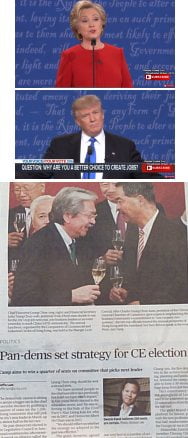I could bear about five minutes of the Hillary-Trump contrived-tedium-fest before fleeing in search of something less mind-numbing. But it reminded me that in a few months’ time,  Hong Kong is due to have its own televised Chief Executive debates – clearly based on the US format and designed to make us think we are watching some sort of parallel, equivalent electoral process.
Hong Kong is due to have its own televised Chief Executive debates – clearly based on the US format and designed to make us think we are watching some sort of parallel, equivalent electoral process.
In reality, Hong Kong’s mayor is picked by the leadership in Beijing, and rubber-stamped by a small ‘Election Committee’ dominated by people who follow the Communist Party’s orders. The pan-democrats have usually been torn about how to treat the charade – should they treat it with disdain, or should they use their token presence on the Election Committee to make some sort of gesture?
In the last two quasi-elections, they took the opportunity offered by the quasi-democratic system to get a name on the quasi-ballot. Although basically futile, it did qualify Alan Leong (2007) and Albert Ho (2012) to take part in live debates, which some people found entertaining or – in the case of viewers in Shenzhen, especially – even intriguing. The downside was that the pan-dems’ participation lent the rigged and phony process a degree of credibility.
Following their success in the recent Legislative Council polls, new/younger/radical pro-democrats are thinking up new approaches to the Chief Executive quasi-election next year. Their key idea is to mobilize their support base in many of the professional- and trade-based Functional Constituencies (and component sub-sectors) and actually put effort into winning seats on the Election Committee – something they’ve never really bothered to do in the past.
They are talking of forming a big enough bloc on the EC to play a potential role of ‘king-maker’.
This assumes that Beijing will allow two of its loyalists to compete for support among the less-disciplined pro-establishment members of the Election Committee – as seen with Henry Tang vs CY Leung in 2012. That might not happen: with splittists winning seats in the legislature, and cracks appearing within the government camp, the central authorities will almost certainly micro-manage the 2017 ‘campaign’ more tightly.
Still, the idea of pan-dems taking Election Committee seats seriously will freak out the Liaison Office, which will be working to pack the Functional Constituency/sub-sector electorates with United Front minions.
In order for the ‘king-maker’ role to work, the pan-dems would obviously not nominate one of themselves onto the quasi-ballot. However, they would if Beijing goes for just a single ‘candidate’ who would otherwise be uncontested.
The Xi Jinping regime might indeed prefer a straightforward Communist-style rubber-stamping without such frills and niceties as a make-believe rival on the ballot alongside the pre-selected winner. That’s especially the case if they end up installing CY Leung for a second term, This raises the scintillating prospect of a pro-dem (a dashing young localist or Eddie Chu-type hero) beating the pre-chosen ‘winner’ in public opinion polls – something Alan Leong and Albert Ho never managed.
This strategy is essentially turning the old pan-dem approach to the CE quasi-election on its head. Rather than confronting the rigged system directly and going down in righteous defeat, the newcomers want to exploit its weaknesses in order to cause inconvenience, even damage. Behold – a less predictable, more creative and more troublesome new pro-democracy camp.

I don’t think it’s true to say the Pan Dems have never tried to win these seats before: there was a big push to do this to get Alan Leong on the ballot, I recall, though probably not in as wide a range of constituencies as they will try this time.
Indeed, I vaguely recall that the effort to win those seats was reasonably successful and was regarded as catching the Liaison Office unawares, as they had not expected the pro-Dems to try to put anyone on the ballot.
Don’t lend any credibility to this charade – ignore it. It make no difference to the result if the CCP want to run the CE selection 2002 style or the more feisty 2012 version.
Debate, sckmegate already. We need a general strike. But people will lose money. So it will never happen.
Hong Kong people’s yellow streak is lined with dollar bills. All the way up the backbone.
Part of the reason for trying to block Beijing’s “reform” of the voting system was because it swapped a system where pan-dems could get on the ballot (but not win) for one where Beijing would essentially select the candidates.
Getting on the ballot is important because, to a certain extent, it keeps the pan-dem voice alive.
China’s one party, multiple factions election committee vs. the US Two Parties, one oligarchy election committee. Can’t say which is worse.
http://www.truthdig.com/report/item/commission_on_presidential_debates_not_a_nonpartisan_organization_20160927